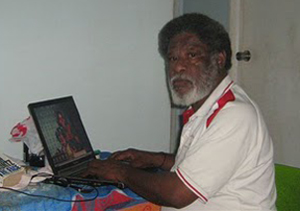
A veteran journalist and Interim chair of the newly formed PNG Media Workers Association, Susuve Laumaea, said this during World Media Freedom Day celebrations in Port Moresby.
He says reporters in PNG have been largely free covering political, social and developments issues without fear or favour.
Laumaea, a veteran journalist, says media freedom in PNG means reporting and informing the country of all that is happening without holding back the truth.
Presenter: Firmin Nanol
Speaker: PNG's newly formed Media Workers Association interim-chair Susuve Laumaea
LAUMAEA: Media freedom is about telling a story about this nation, its development, how Papua New Guineans look at life and how they want to develop their country, how the government operates, and freely informing the people, expressing the wish that, expressing those developments in language that they all understand without any due harassment, without threats, without intimidation.
NANOL: So do you think the media in Papua New Guinea is free?
LAUMAEA: The media is vibrant, it's free to an extent it is, it is very free. I have had no experience where the media has been kept out from exercising its freedom. We may have had one or two incidents where journalists have been threatened and intimidated or assaulted, but those are isolated incidents. Generally the media is very free in this country.
NANOL: And to the reporters and individual reporters working and reporting in the last couple of months or so during this political crisis and the constitutional issues that the country faced, the Media Workers Association foresaw any sort of witnesses or the strengths that the reporters had in the industry came to light and we need improvements on?
LAUMAEA: I think the media was very independent in its reporting of events that unfolded since August 2nd last year up till the present day as we speak. The events over the last few weeks with the public protests against the government's legislative initiatives were expected reaction from the public of Papua New Guinea, and they were freely and fairly reported by the media in Papua New Guinea.
NANOL: Now this new association, the Papua New Guinea Media Workers Association, that covers all persons working within the media industry in the country. How do you foresee the future of that association?
LAUMAEA: This association is a long time coming, and the fact that it is here it can only go from strength to strength, and I can see this baby grow and it's going to be a very powerful entity to deal with by those that are in power, and those that try to cross our path in a threatening way.
NANOL: Susuve you've been in the media industry as a journalist yourself before the social media and other forms of media came into being. Now when you're looking back from the outside, although you're a regular commentator, how has social media changed the perceptions and the way reporters work in the mainstream media?
LAUMAEA: I think reporters are now forced to be very mindful of the accuracy of what they record because everything they write, they write for the newspapers, they write for the radio and write for the television are snapped up by those social commentators, and before you know it it's pasted all over the social media attracting very, very lively commentary from any number of people. So it's brought very healthy competition into the journalism fraternity, people who practise the profession of journalism are now more alert, more conscious of the need to be very accurate, very honest in their reporting.
NANOL: Do you think there's any chances of the Papua New Guinea government, anyone for that media in PNG being censored?
LAUMAEA: I think that'll be a long time coming, if we continue to have leaders such as Peter O'Neill who is committed to free media in Papua New Guinea. Maybe we will get some despots in the future, but that is only hypothetical. But I don't think any restrictive limitations will be placed on the PNG media in the immediate future.
NANOL: With that freedom of information comes responsibility, what is the message to reporters in Papua New Guinea?
LAUMAEA: We have a very vibrant, very free media in Papua New Guinea. It can only advance when we report honestly, we report truthfully and we are ethical about what we write.
This work is licensed under a Creative Commons Attribution-NonCommercial 3.0 New Zealand Licence.




